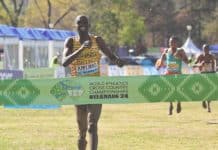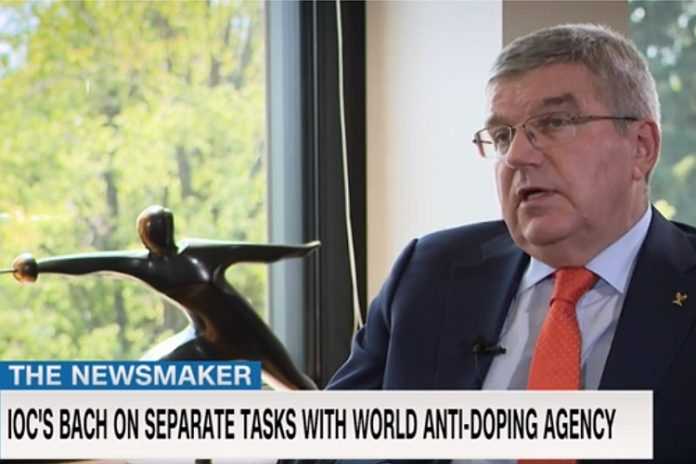Say what you will about the International Olympic Committee and its 64-year-old president, Thomas Bach of Germany, but he’s not shy.
Bach gave a wide-ranging, 27-minute interview with Martina Fuchs on the CNN Money Switzerland program, “The Newsmaker” and covered almost every hot topic in the Olympic Movement today.
Fuchs let him speak and wasn’t too aggressive with follow-up questions, but Bach had a lot to say, especially about his anxiety with the way the Olympic Games is being characterized in potential candidate cities, especially for the 2026 Winter Games.
Asked about the defeat of the 2026 candidature of Sion in a referendum on the Canton (state) of Valais, Bach was ready.
“This is a referendum, this is a democratic procedure; we respect this. Even if we would have wishes that the arguments of the responsible people who were bringing this candidature forward would have been heard a little bit better, because the Olympic Agenda [2020] played an important role.
“And what is a little bit of pity maybe, is that the emotions around the Olympic Games, the magic of the Olympic Games, the support for the Swiss athletes, that all this did not play a real role. This is, at the end, what the Games are all about. They are about the athletes, they are about this magic, they are about the emotions, they are about excellence, they are about being good hosts.
“And all of this was reduced to a financial question and not discussed in a way which really reflected all the options which the Olympic Agenda is offering.”
Fuchs pointedly asked if a lack of trust in the IOC was a factor in the loss. Again, Bach was ready:
“This discussion took place more in some media than among the population. We have seen the polls and we have had constant contact with the candidature committee and there we were told it was three topics which played a role: the first one was money, the second was money and the third was money. And there, even with respect to money, the IOC has a lot to offer, because we are contributing to the success of Olympic Winter Games, with about $1 billion – to be precise – 925 million U.S. dollars.”
And Bach, at the end, emphasized what he felt is the key element not being discussed in potential host cities that is the core of why the Games are important:
“The Olympic spirit today is more important than ever, I think, because we are living in a very fragile world. And the Olympic Games are maybe the only event in this world which still manages to get the whole world together.
“You have 206 National Olympic Committees in one place at the same time, the athletes competing with each other, but living at the same time in the Olympic Village together under one roof. And this without any kind of discrimination , regardless of any of the backgrounds, be it political or religious or sexual orientation or whatever.
“And this unifying power of the Olympic spirit, we need more than ever because we see that the world becomes more and more ego-centric, that it’s more and more individualization and therefore, we are happy that we can still present this unity in all the diversity of humanity.”
He noted, with considerable satisfaction – not quite glee, but as close as Bach will allow in public – the role that the Winter Games in PyeongChang earlier this year played in Korean politics. Fuchs opened the door by noting that the Games presented an opportunity for the North Koreans to stage a “charm offensive.” Bach replied:
“If a charm offensive leads to a peace negotiations, every charm offensive in this world is welcome by the IOC. And this is what, in effect, we managed there with the actions in the Olympic Winter Games – and we [had] there the joint march of the two Korean teams, the joint women’s ice hockey team – they opened the door for the peace talks which were following there. Then the politicians were walking through this open door. This is why we are extremely happy with this achievement and why we are very satisfied that these talks are going on and that since then, the tensions on the Korean Peninsula are much, much lower than even the day before the Olympic Winter Games.”
Bach’s subtle point, made throughout the show, was that if these achievements are also placed on the scale of public opinion – along with money – that the scale will tip more toward the Games than away from them.
However, he also had a lot to say about money.
“One four-years term – the Olympiad – is our budgeting time. And there, we hope, and we are pretty sure, given the success we enjoy on the marketing front and on the TV front, that for this Olympiad – that means from 2017 to 2020 – that we will exceed revenues of 6 billion U.S. dollars, 90 percent of which are going directly back to sport. So, this is from where you can see that we are a not-for-profit organization, because we are investing in the development of sport in all parts of the world and in supporting athletes all over the world.
“We are offering a lot of possibilities for organizing committees to cut the budget, and as one of the implementation measures of Olympic Agenda 2020, we have made more proposals and recommendations, what we are calling ‘The New Norm.’ And applying these ‘new norms’ can lead to budget cuts – additional budget cuts – of a potential of about one billion U.S. dollars [per Games] more.
“But speaking of Tokyo, you always have to take into consideration that you cannot speak only of expenditures. You also have to speak about the revenues. And there you see that Tokyo will achieve the most successful – by far – marketing program in the Olympic history, and that Tokyo will enjoy the support of the IOC with about 1.6 billion U.S. dollars. So there you can see that organizing the Olympic Games is a feasible investment. And in PyeongChang 2018, you will hear in the near future that there the budget will again make [an operating] profit.”
Fuchs had all of the rest of the hot-button questions ready, about doping, eSports and more. Highlights:
On doping: “The IOC is taking a tough position. We excluded Russia from the Olympic Winter Games in PyeongChang. This is the toughest sanction we can impose there on a National Olympic Committee, and now we have seen many reforms in Russia in the anti-doping system. I hope that they will bear fruit and I hope that this will have a deterrent effect on all those who may consider to support such a system, but I have no indication that it’s happening in this way [again].
“But doping will always happen. This is one of the wars you cannot win.”
On eSports: “It’s obviously a very growing phenomenon; this is why we established a dialogue with the eSports industry.
“[W]e see the development, we see the differences and we are looking for things we may have in common. And the differences are pretty clear; we have on the one hand, an industry – a profit-oriented industry – and we have on the other hand, a values-based, not-for-profit organization and to being these together is not easy.”
On unused stadiums from prior Games: “We could now enter into a long discussion about which facilities are used or allegedly not used there. The storytelling is not always reflecting the reality, but we have anyway turned the page in this respect and we make it now obligatory for every city which want to be a candidate for the Olympic Games to present a sustainability plan from the very beginning of the candidature. And then we are following this up during all the candidature phase, so this is one of the reforms we have undertaken.”
Bach was asked what was his biggest challenge right now. He didn’t hesitate: “The biggest challenge is to make people believe that the reforms are really bearing fruit, and to get this message across. The other big challenge for the Olympic Movement is to keep its political neutrality … to keep the athletes at the heart of the Olympic Movement and to make sure that the sports competitions are in clean competitions and good governance measures are also applied, not only in the IOC, but across the Olympic Movement.” He has the ideas right, but convincing others is, as he says, “not easy.”
Rich Perelman
Editor



















